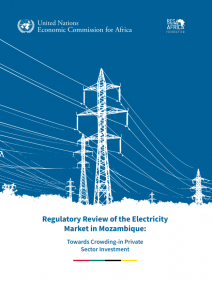This report provides an analysis of Mozambique ‘s electricity sector policies, laws, and regulations in relation to crowding-in private sector participation in developing national electricity infrastructure. Mozambique has enjoyed stable economic growth during the last two decades. With the implementation of political and economic reforms, real GDP growth averaged 5 percent between 2010 and 2020, making it one of the fastest-growing countries in Sub-Saharan Africa. The country has been actively pursuing energy sector reforms for more than two decades. Reforms have included the privatization of the national utility, Electricidade de Moçambique (EdM), and the introduction of the Electricity Law, which provided an element of competition and opened the electricity sector to new entrants. The Electricity Law, adopted in 1997, regulates the licensing of energy projects and related activities. Its purpose is to open the energy sector to greater private sector participation through concession contracts with the government and the implementation of power purchase agreements (PPAs) with the national utility EdM. The law requires that projects related to power generation, transmission, and distribution, as well as the construction, operation, and management of power plants be awarded concessions through a public competitive bidding process. The purpose of this regulatory review is to pinpoint the main strengths and gaps of the policy and regulatory framework currently in force related to private sector participation in the entire electricity market. It further aims to offer concrete recommendations for regulatory improvement and reform towards attaining a competitive, resilient, and sustainable electricity market. The regulatory analysis is undertaken following a comprehensive UNECA and RES4Africa regulatory review methodology, which was developed with the participation of African and international regulatory experts.
Share this:
Release Date:
10 November, 2023
© United Nations Economic Commission for Africa

